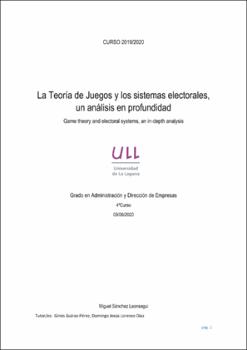Teoría de juegos y sistemas electorales: un análisis en profundidad
Author
Sánchez Leonsegui, MiguelDate
2020Abstract
In this document, an in-depth analysis will be carried out on the different electoral systems from Game
Theories point of view, their main characteristics, and some practical examples with different simulations.
In the first place, some previous concepts of great importance to understand the work will be reviewed, both
in game theory and political theory. Next, some of the main proportional electoral systems will be presented.
Later, the electoral systems of majority will be introduced, with some examples and their main
characteristics. Specifically, the focus will be on majority systems with a single-member constituency.
Then a practical assumption will be made in which all the information previously seen is used to analyze a
real case of elections in Spain, with the results of real votes, and it will be seen how according to the system
and mathematical formula used, the electoral results would change sustantially.
Lastly, there will be a thought about the mutability of reality, on how electoral systems directly affect us as
people and how they obey specific situations, philosophies, and interests of different countries. En el presente trabajo, se realizará un análisis en profundidad sobre los diferentes sistemas electorales
desde el punto de vista de la teoría de juegos, sus principales características y algunos ejemplos prácticos
con diferentes simulaciones.
En primer lugar, se revisarán algunos conceptos previos de suma importancia para entender el trabajo,
tanto de teoría de juegos como de teoría política. Seguidamente se presentarán algunos de los principales
sistemas electorales de tipo proporcional.
Posteriormente se introducirán los sistemas electorales de mayoría, con algunos ejemplos. Se profundizará
para conocer en qué consisten y sus principales características. En concreto, se pondrá el foco en sistemas
mayoritarios con circunscripción uninominal.
Luego se realizará algún supuesto práctico en el que se utilice toda la información vista anteriormente para
analizar un caso real de elecciones en España, con los resultados de votos reales, y se verá cómo según
el sistema y fórmula matemática utilizada, los resultados electorales serían unos u otros.
Por último, se realizará una reflexión acerca de la mutabilidad de la realidad, sobre cómo los sistemas
electorales nos afectan directamente como personas y cómo estos obedecen a situaciones, filosofías e
intereses concretos de los diferentes países





